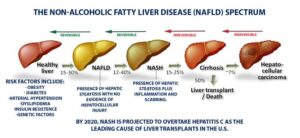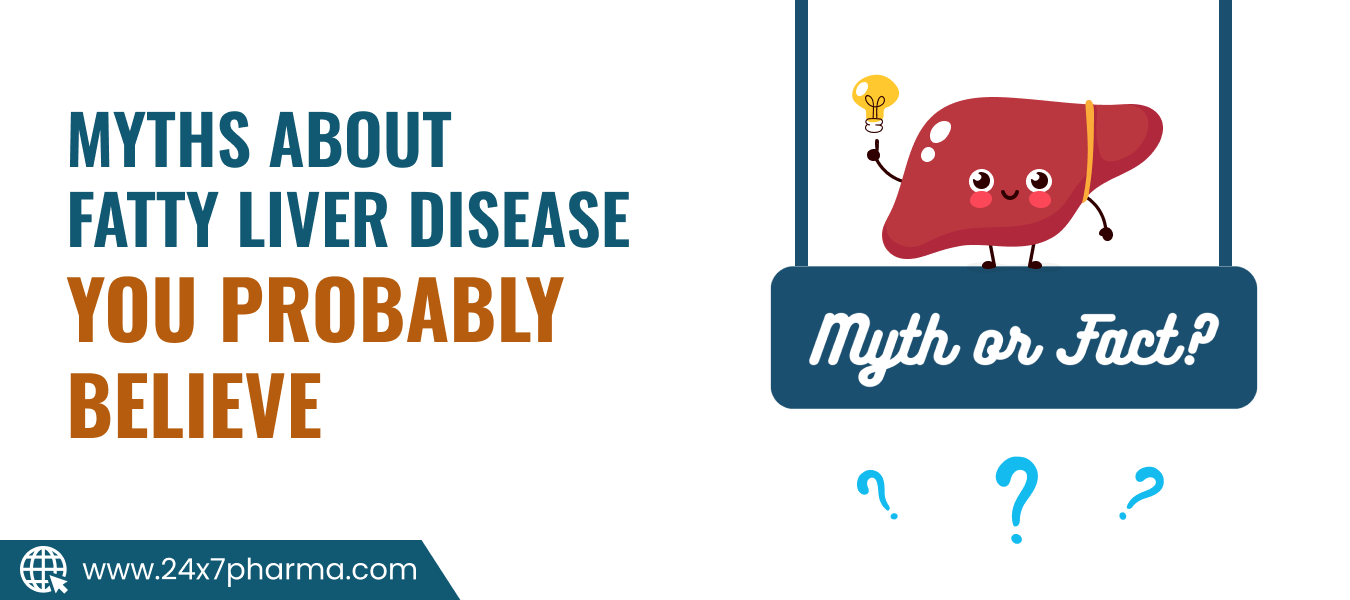Fatty liver disease is a quiet but commonly faced health problem worldwide. There are a lot of misconceptions surrounding this disease, given its highly popular nature. It is often misunderstood by multiple people regarding the symptoms, causes, and modes of treatment of fatty liver . If you have ever held a position on what it does, you are not alone. Here, we are going to dispel some of the most common myths regarding fatty liver disease.
Myth 1: Fatty Liver Cannot Affect Anyone But Overweight People
Truth: Yes, it goes without saying; obesity is a major risk factor. This condition found the possibility to affect people with various weights; fatty liver disease has been known to most frequently affect non-obese people. Non-alcoholic fatty liver disease (NAFLD), a very dangerous subtype of the fatty liver, develops in normally healthy BMI individuals.
 What contributes to fatty liver disease in non-overweight people? Genetics, rapid weight loss, type 2 diabetes, high cholesterol, or even some medications. This means that one has to be on the lookout for liver disease warnings, no matter how healthy they might look on the outside.
What contributes to fatty liver disease in non-overweight people? Genetics, rapid weight loss, type 2 diabetes, high cholesterol, or even some medications. This means that one has to be on the lookout for liver disease warnings, no matter how healthy they might look on the outside.
Myth 2: You Will Feel The Symptoms Of Fatty Liver Disease Quite Early
Truth: The most dangerous aspect concerning fatty liver is that the early symptoms are very often asymptomatic. Many people do not even realize they have it until they experience more severe symptoms, namely fatigue, abdominal discomfort, or unexplained weight loss.
There are instances whereby the symptoms of fatty liver disease only develop when the liver is inflamed or scarred. Hence, this gives more reason to conduct routine health check-ups and blood tests to evaluate their liver enzymes, specifically when one has risk factors for liver diseases.
Myth #3: Fatty Liver Is Irreversible
Reality: Fatty liver may be reversed, especially in its early stages. Lifestyle interventions-such as identifying a diet for fatty liver disease and exercising regularly-can considerably enhance liver health.
Letting foods such as whole grains, lean protein, and an abundance of fruits and vegetables guide how you eat can help diminish fat in the liver. Along with that, you have to stop taking sugar, refined carbs, and alcohol. Some fatty liver supplements, such as omega-3 fatty acids or milk thistle, have been likewise shown to support the liver, though this will never replace doctor-prescribed treatments.
Taking these necessary changes early allows for the total reversal of the disease. In its advanced stages, such as cirrhosis among others, it may require much more intensive treatment.
Myth #4: Alcohol Is the Major Cause of Fatty Liver Disease
Reality: Most of the time, people associate liver disease with excessive alcohol usage. While this might subject you to alcoholic fatty liver, it is clearly not the commonest culprit.
So, what would account for cirrhosis if alcohol isn’t to blame? The combination of bad diet, sedentary lifestyle, insulin resistance, and some genetic factors is the major reason. It is critical to identify these causes so as to allow early intervention and prevention.
Myth #5: Medications Are the Best Treatment for Fatty Liver

Reality: Some medications for fatty liver disease might treat the risk factors of diabetes or high cholesterol, while none are capable of curing. The most effective treatment for fatty liver lies in lifestyle changes.
Research continues to explore new medical treatments. The best approach, however, is to combine a healthy lifestyle and diet with exercise and the treatment of any underlying health concerns that may contribute to this condition. At this point, various herbals like turmeric, dandelion root, and milk thistle are recommended for people with fatty liver disease. All these herbs have different actions with respect to the live. Turmeric and dandelion are believed to enhance biliary circulation, whereas milk thistle protects the liver.
Myth #6: Fatty Liver Disease Always Means Liver Failure
Reality: Fatty liver disease does not always mean liver failure. In many cases, people diagnosed with fatty liver disease and that have it caught early combine conscientious efforts , live full healthy lives without ever becoming severely liver damaged.
However, to not act on the warning signs of liver disease can lead to dire complications, such as fibrosis, cirrhosis, or liver cancer. Therefore, it is important to see a doctor once liver disease symptoms are seen, especially if diagnosed with fatty liver disease.
Myth #7: Low-Fat Diets Are the Answer
Reality: While it might seem reasonable that dietary fat reduction is the answer to fatty liver, don’t take this at face value. A low-fat diet alone will not make the issue disappear. Instead, choose a balanced diet that restricts processed foods, added sugars, and unhealthy fats in favor of more balanced foods.
Instead, a well-designed diet for fatty liver disease is rich in nutrient-dense foods promoting complete liver health. These foods include:
- Greens, rich in antioxidants
- Healthy fats, such as avocados and nuts
- Whole grains
- Lean protein sources, like fish and poultry
Always cut back on sugary drinks, fried foods, and alcohol since these often exacerbate liver problems.
Myth #8: Exercise Doesn’t Help Fatty Liver Disease
Reality: Exercise is one of the best methods to deal with fatty liver. Regular exercise can decrease fatty buildup in the liver, improve insulin sensitivity, and help with weight management—all factors that can protect your liver.
Even moderate activity, such as brisk walking for 30 minutes or so each day, can make a remarkable impact. Combining exercise with a proper fatty liver diet strengthens their combined effect and benefits generally for health improvement.
Myth #9: Among Adults, There Are Only Fatty Liver Disease
Reality: Fatty liver is not only great in adults, but now rising cases of childhood obesity are now being compounded with higher incidence of the disease in children.
Other common signs in a child that may point to liver damage include fatigue, abdominal pain, or dark patches of skin, which indicates insulin resistance. It is the responsibility of parents to teach children healthy eating habits and an active lifestyle early in childhood to avoid developing liver diseases later in life.
Myth #10: Fatty Liver Gets Cured Just by Herbals and Supplements
Reality: care included specific herbs might have liver-supporting properties, but supplements have become a great adjunct of a more extensive treatment plan than a cureall. Supplements should never replace medical care, lifestyle modifications, or prescribed treatments.
If you intend for such fatty liver disease supplements, talk with the healthcare provider to ensure they are safe and appropriate for your condition.
Recognizing the Warning Signs of Liver Disease
While early recognition of liver disease warning signs could be vital for the early diagnoses of fatty liver disease, keep note of some such signs that must not be ignored:
- Continued fatigue
- Weight loss without any explanation
- Some kind of abdominal pain or swelling
- Yellowing of the skin or eyes (jaundice)
- Dark urine or light-colored stool
- Nausea or appetite loss
If any of these symptoms come to your attention, get yourself checked with a doctor on priority.
Read More :Fatty Liver Disease: Symptoms, Causes, and Prevention
Takeaway: Separating Fact from Fiction
Fatty liver is a manageable condition if you have the right information. When you know what fatty liver disease is, the possible causes, and how it can be treated, you are on course to make great adjustments in your life.
Sending the right food for fatty liver, regular exercise, and working on possible risk factors can protect the liver while making you better as a whole. Remember, while the liver is exceptionally strong, it needs your help to function happily. Don’t be misled by lies; start making informed decisions today.

